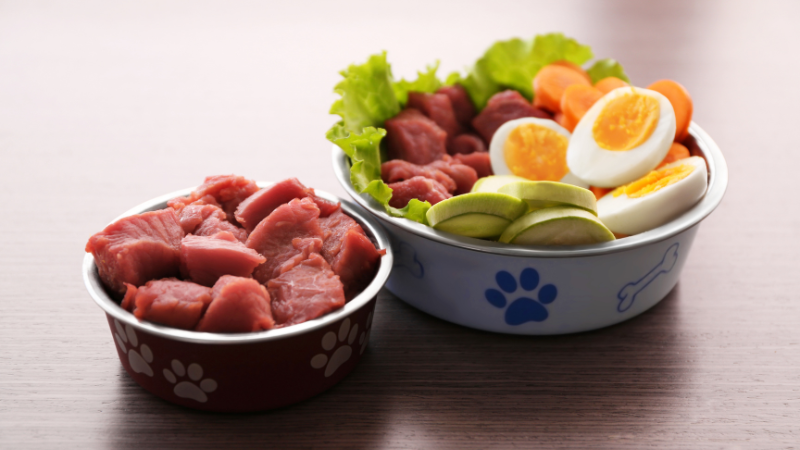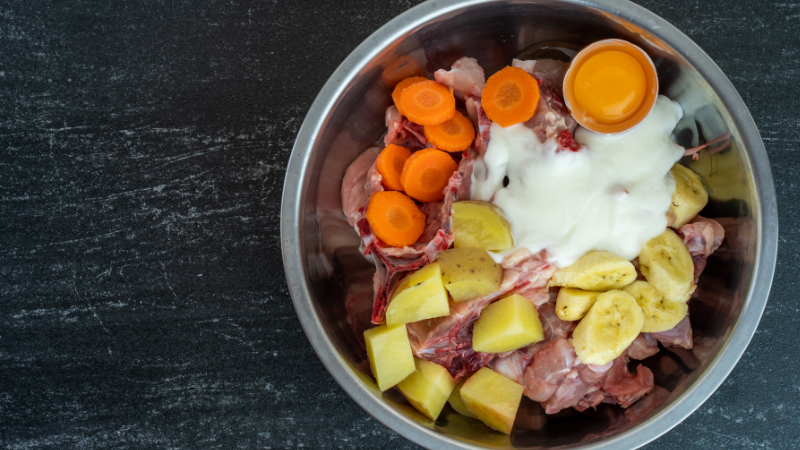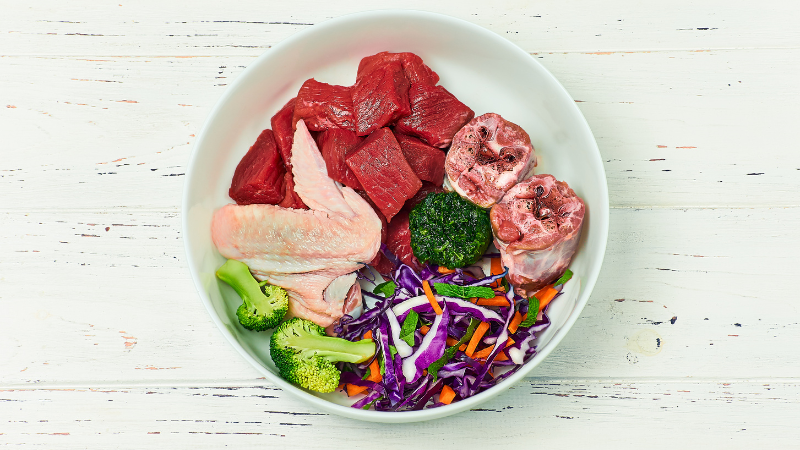Vet approved homemade dog food recipes for kidney disease can effectively support your dog’s health. These recipes are specially formulated to meet the nutritional needs of dogs with kidney disease, helping them thrive and stay healthy.
If your dog has been diagnosed with kidney disease, providing a balanced and kidney-friendly diet is crucial for their well-being. Making homemade dog food with vet-approved recipes ensures that you are offering your furry friend a nutritionally sound and safe diet.
These recipes often include high-quality protein sources, limited phosphorus and sodium levels, and essential nutrients to help support kidney function. We will explore some vet-approved homemade dog food recipes that are specifically designed for dogs with kidney disease.
These recipes are not only healthy and delicious but also provide the necessary nutrients for your furry companion’s well-being. By preparing these meals at home, you can have peace of mind knowing that you are taking the best care of your dog’s kidney health.
Understanding Kidney Disease In Dogs
Kidney disease is a common ailment that affects many dogs, especially as they age. Understanding the causes and symptoms of kidney disease is essential for dog owners to provide the best care possible for their beloved pets. This article will delve into the causes and symptoms of kidney disease in dogs, providing you with valuable insights to help you identify and manage this condition.
Causes Of Kidney Disease
The causes of kidney disease in dogs can vary, and it’s important to be aware of the potential factors that can contribute to this condition. Some of the common causes include:
- Toxic substances: Certain medications, chemicals, or ingested toxins can damage the kidneys and lead to kidney disease.
- Age: As dogs age, their kidneys may naturally deteriorate, making them more susceptible to kidney disease.
- Infections: Urinary tract infections or other bacterial or viral infections can impact kidney function.
- Genetics: Certain breeds are predisposed to kidney disease due to their genetic makeup.
- Underlying health conditions: Dogs with conditions such as high blood pressure or diabetes are at a higher risk of developing kidney disease.

Symptoms Of Kidney Disease
Recognizing the symptoms of kidney disease is crucial for early detection and intervention. Some common symptoms to watch out for include:
- Increased thirst and urination: Dogs with kidney disease may drink more water than usual and experience frequent urination.
- Decreased appetite and weight loss: Loss of appetite and unexplained weight loss can indicate kidney problems.
- Changes in urine: Urine may appear darker or lighter in color, and there may be blood in the urine.
- Lethargy and weakness: Dogs with kidney disease may show reduced energy levels and seem generally weak and tired.
- Vomiting and diarrhea: Frequent episodes of vomiting and diarrhea can be signs of kidney disease.
- Bad breath: Build-up of toxins in the body due to impaired kidney function can lead to unpleasant breath.
It’s important to remember that these symptoms may not always be exclusive to kidney disease, so consulting with a veterinarian is essential for an accurate diagnosis.
Importance Of Diet In Managing Kidney Disease
When it comes to managing kidney disease in dogs, diet plays a crucial role. The right diet can help support kidney function, reduce symptoms, and improve your furry friend’s overall quality of life. It is important to work closely with your veterinarian to develop a nutrition plan that meets your dog’s specific needs. Homemade dog food recipes that are vet-approved can be a great option for dogs with kidney disease, as they allow you to have more control over the ingredients and can be tailored to your dog’s individual needs.
Role Of Diet In Kidney Function
The diet you choose for your dog with kidney disease can significantly impact their kidney function. The kidneys are responsible for filtering waste products from the blood and maintaining proper fluid balance in the body. When the kidneys are not functioning properly, they may struggle to remove waste products, leading to a build-up of toxins in the body. This is why it is crucial to provide a diet that supports kidney function and helps reduce the workload on the kidneys.

Benefits Of Homemade Dog Food For Kidney Disease
Homemade dog food recipes can offer several benefits for dogs with kidney disease. Here are a few reasons why homemade dog food can be a good choice:
- Control over ingredients: By preparing homemade dog food, you have full control over the ingredients used in the recipe. You can choose high-quality protein sources, such as lean meats, which are essential for maintaining muscle mass while minimizing the amount of phosphorus in the diet.
- Lower phosphorus levels: Excessive phosphorus in the diet can put additional strain on the kidneys. Homemade dog food recipes for kidney disease often focus on reducing phosphorus levels by using ingredients with lower phosphorus content and adding phosphate binders to the diet.
- Customization to meet individual needs: Each dog with kidney disease may have different dietary requirements based on their stage of the disease and the severity of their symptoms. Homemade dog food allows you to tailor the recipe to your dog’s individual needs, ensuring they receive the appropriate nutrients and fluids.
Remember, it is essential to consult your veterinarian and follow their guidelines when preparing homemade dog food for kidney disease. They can help you determine the right balance of ingredients and ensure that your dog receives the necessary nutrients while managing their kidney disease effectively.
Consulting With A Veterinarian
Consulting with a veterinarian is crucial when it comes to preparing homemade dog food recipes for kidney disease. Your veterinarian is the best source of information and guidance when it comes to your furry friend’s health. They can provide the right diagnosis, recommend dietary restrictions, and help you create a tailored meal plan that meets your dog’s specific nutritional needs.
Why Consult A Vet
Consulting a veterinarian is important because they have the education, expertise, and knowledge to diagnose and manage kidney disease in dogs effectively. They can assess your dog’s condition, evaluate their overall health, and determine the severity of the kidney disease. This information is essential in designing a diet that supports your dog’s kidney function.
Getting A Proper Diagnosis
Getting a proper diagnosis is the first step towards managing kidney disease in dogs. Consulting with a veterinarian allows for proper diagnostic tests to be conducted, including blood work, urinalysis, and potentially other imaging tests. These tests provide valuable insights into your dog’s kidney function and help determine the appropriate approach for their diet.
Understanding Dietary Restrictions
Understanding dietary restrictions is crucial when it comes to managing kidney disease in dogs. A veterinarian can help you navigate the dietary maze by specific recommendations. These recommendations may include restricting certain nutrients like phosphorus and protein, while ensuring the right balance of other essential nutrients. Consulting with a veterinarian ensures you are providing the right food that meets your dog’s nutritional needs while supporting their kidneys.

Creating Homemade Dog Food For Kidney Disease
When it comes to managing kidney disease in dogs, a carefully crafted diet plays a crucial role in supporting their overall health and well-being. While commercial dog food options are readily available, many pet owners prefer creating homemade meals for their furry friends as it allows for better control over the ingredients and nutritional content. In this article, we will explore the process of creating homemade dog food specifically tailored for dogs with kidney disease. We’ll discuss considerations for formulating a recipe, choosing the right ingredients, and balancing nutritional requirements.
Considerations For Formulating A Recipe
Formulating a homemade dog food recipe for kidney disease requires careful consideration of several factors. It is essential to consult with a veterinarian to determine the specific dietary needs of your dog based on their stage of kidney disease and individual health requirements.
Here are a few essential considerations to keep in mind:
- Protein Restriction: Dogs with kidney disease require a controlled amount of high-quality protein to reduce the workload on their kidneys. Your veterinarian will guide you on the appropriate level of protein restriction for your dog.
- Phosphorus Control: Excessive phosphorus can be detrimental to dogs with kidney disease. It is important to include ingredients low in phosphorus or use ingredients that allow for easy phosphorus extraction.
- Fluid Intake: Adequate hydration is crucial for dogs with kidney disease. The homemade diet should have a good water content to support hydration and overall kidney function.
- Low Sodium: Sodium intake should be kept to a minimum to prevent fluid overload and maintain a healthy blood pressure level for dogs with kidney disease.
Choosing The Right Ingredients
When it comes to selecting ingredients for homemade dog food, opting for high-quality, easily digestible ingredients is key. Here are some options to consider:
- Lean Protein Sources: Choose lean meats such as skinless chicken, turkey, or lean cuts of beef as they are low in fat and provide essential amino acids.
- Fruits and Vegetables: Include a variety of fruits and vegetables in your dog’s meals to provide necessary vitamins, minerals, and antioxidants. Some suitable options include carrots, green beans, sweet potatoes, and apples.
- Omega-3 Fatty Acids: Incorporate fish oil or flaxseed oil into the recipe for their omega-3 fatty acid content, which offers anti-inflammatory properties and supports kidney health.
- Carbohydrate Choices: Select whole grains like brown rice or quinoa as a source of carbohydrates, ensuring they are cooked thoroughly to improve digestibility.

Balancing Nutritional Requirements
Creating a balanced diet for dogs with kidney disease involves ensuring they receive adequate amounts of all essential nutrients. Working closely with a veterinarian or veterinary nutritionist can help achieve this balance. Here are a few tips:
- Consult with a professional to determine the appropriate portion sizes and ratios for your dog’s specific needs.
- Consider using recipes developed by veterinary nutritionists specifically for dogs with kidney disease, as these provide optimal balance and prevent nutritional deficiencies.
- Supplementation may be necessary to meet specific nutrient requirements. Your veterinarian can recommend suitable supplements, such as omega-3 fatty acids, B vitamins, or probiotics.
By carefully considering the right ingredients and nutritional balance, you can provide your dog with a homemade diet that supports their overall health and helps manage kidney disease. Remember to consult with a veterinarian throughout the process to ensure your dog’s specific dietary needs are met.
Sample Homemade Dog Food Recipes
When your dog is diagnosed with kidney disease, it’s essential to provide them with a balanced and nutritious diet that supports their specific needs. Creating homemade dog food recipes can be an excellent way to ensure your furry friend gets the right nutrients while avoiding ingredients that may worsen their condition. Here are three vet-approved recipes tailored to address various aspects of kidney disease: low protein and phosphorus diet, high fiber and hydration diet, and limited sodium and potassium diet.
Recipe 1: Low Protein And Phosphorus Diet
For dogs with kidney disease, a low protein and phosphorus diet can help reduce strain on the kidneys and manage their condition effectively. Here’s a simple recipe that meets these requirements:
| Ingredients | Amount |
|---|---|
| Chicken breast (boneless and skinless) | 1 cup |
| White rice (cooked) | 1 cup |
| Carrots (cooked and mashed) | 1/2 cup |
| Peas (cooked and mashed) | 1/2 cup |
| Low sodium chicken broth | 1/2 cup |
This recipe provides a balanced mix of nutrients while keeping protein and phosphorus levels minimal. It’s essential to consult with your vet about the appropriate portion size and feeding frequency for your dog.
Recipe 2: High Fiber And Hydration Diet
Incorporating high fiber and hydration in your dog’s diet can assist with kidney disease management. This recipe includes hydrating ingredients and a fiber-rich component:
- Lean ground turkey – 1 cup
- Pumpkin puree – 1/2 cup
- Brown rice (cooked) – 1/2 cup
- Spinach (chopped) – 1/2 cup
- Low sodium chicken broth – 1/4 cup
This recipe offers ample hydration and fiber that aid in maintaining optimal kidney health. The turkey provides protein in moderation, suitable for dogs with kidney disease.
Recipe 3: Limited Sodium And Potassium Diet
A limited sodium and potassium diet can be beneficial for dogs with kidney disease, as these elements need to be monitored carefully. Here’s a recipe that prioritizes these limitations:
- Salmon fillet (cooked and flaked) – 1 cup
- Quinoa (cooked) – 1/2 cup
- Zucchini (grated) – 1/2 cup
- Cauliflower (steamed and mashed) – 1/2 cup
- Low sodium vegetable broth – 1/4 cup
This recipe is focused on balancing sodium and potassium levels while providing essential nutrients. It’s crucial to consult with your veterinarian to ensure these quantities are suitable for your dog’s needs and condition.
Tips For Preparing Homemade Dog Food
Cooking Methods And Techniques
When it comes to cooking homemade dog food for dogs with kidney disease, it’s important to utilize cooking methods and techniques that help retain the nutritional value of the ingredients while making the food more palatable for your furry friend. Here are a few cooking methods and techniques to consider:
- Boiling: Boiling is a simple and effective way to cook food for dogs with kidney disease. It helps remove excess sodium and phosphorus from the ingredients while retaining moisture.
- Steaming: Steaming is another gentle cooking method that helps preserve the nutrients in the ingredients. It also helps make the food easier to digest for dogs with kidney disease.
- Baking: Baking is a great way to cook dog food while enhancing the taste and aroma. Avoid using excessive fats or seasoning that can be harmful to your dog’s health.

Portion Control And Feeding Schedule
Proper portion control and a regular feeding schedule are crucial when preparing homemade dog food for dogs with kidney disease. The following guidelines can help you establish an appropriate routine:
- Consult a veterinarian: A vet can provide guidance on how much food your dog should consume based on their specific dietary needs and health condition.
- Weighing the food: Measure the food portions accurately, preferably using a kitchen scale, to ensure your dog is receiving the right amount of nutrients without overfeeding.
- Divide the meals: Split your dog’s daily food intake into several smaller meals throughout the day. This helps prevent overfeeding and aids in better digestion.
- Stick to a schedule: Establish a consistent feeding schedule that aligns with your dog’s specific needs. This promotes regular bowel movements and helps monitor their appetite.
Ensuring Food Safety And Hygiene
When preparing homemade dog food, it’s crucial to prioritize food safety and maintain proper hygiene to avoid any potential health risks. Here are some essential steps to ensure food safety:
- Fresh ingredients: Use fresh and high-quality ingredients to maintain the nutritional value of the food. Avoid using ingredients that are past their expiration dates.
- Clean cooking area: Keep your cooking area clean and sanitized to prevent cross-contamination. Wash all utensils and surfaces thoroughly before and after cooking.
- Raw meat precautions: If you include raw meat in your dog’s diet, handle it with caution to minimize the risk of bacterial contamination. Store raw meat separately from other ingredients to avoid cross-contamination.
- Storage guidelines: Properly store homemade dog food in airtight containers in the refrigerator. Avoid keeping the food for too long, as it might lose its nutritional value and become unsafe.
Monitoring And Adjusting The Diet
When it comes to managing kidney disease in dogs, a vital aspect of their treatment is closely monitoring and adjusting their diet. Through regular veterinary check-ups, monitoring urine and blood test results, and modifying the recipe as needed, you can ensure that your furry friend receives the necessary nutrition while effectively managing their condition.
Regular Veterinary Check-ups
To effectively monitor and adjust your dog’s homemade diet for kidney disease, it is crucial to schedule regular veterinary check-ups. Your veterinarian will assess your dog’s overall health, kidney function, and provide the necessary guidance to ensure that the diet is meeting their specific nutritional needs. Regular check-ups will also allow your vet to track any changes in your dog’s condition and make adjustments to the diet plan accordingly.
Monitoring Urine And Blood Test Results
Monitoring urine and blood test results is an essential part of managing kidney disease in dogs. These tests help determine the level of waste products and electrolytes in your dog’s body and provide insight into their kidney function. By regularly analyzing these results, your veterinarian can assess the effectiveness of the homemade diet and make any necessary modifications. Ensure that you follow your veterinarian’s recommendation for the frequency of these tests to closely monitor your dog’s progress.
Modifying The Recipe As Needed
Every dog is unique, and their nutritional requirements may vary. Therefore, it is important to be flexible and modify the homemade diet as needed to meet your dog’s specific needs. By working closely with your veterinarian, you can make adjustments to the recipe based on your dog’s urine and blood test results, overall health, and changing condition. It could involve altering the proportion of ingredients, adding or omitting certain components, or adjusting the cooking method. Be sure to consult your veterinarian before making any significant changes to ensure that your dog’s nutritional needs are met.
Other Considerations For Managing Kidney Disease
When your beloved furry friend is diagnosed with kidney disease, it is essential to provide them with the best care and attention to ensure their well-being. In addition to the right diet, there are other important factors to consider in managing kidney disease in dogs. These factors can significantly contribute to your dog’s overall health and improve their quality of life. Here are three key considerations you should keep in mind:
Providing Fresh Water At All Times
One of the simplest yet vital steps in managing kidney disease in dogs is ensuring that they have access to fresh water at all times. Water plays a crucial role in maintaining adequate hydration and supporting kidney function. It helps flush toxins from their system and prevents dehydration, which can worsen kidney disease symptoms. Always make sure to keep their water bowl clean and filled with fresh, filtered water.
Managing Medication And Supplements
Properly managing your dog’s medication and supplements is crucial to their overall well-being. The veterinarian will prescribe specific medications to help maintain kidney function and manage the symptoms. It is essential to follow the prescribed dosage and administer the medications as instructed. Additionally, your vet may recommend certain supplements, such as fish oil or probiotics, that can be beneficial for dogs with kidney disease.
Table: Essential Medications and Supplements for Dogs with Kidney Disease
| Medications | Supplements |
|---|---|
| Blood pressure medications | Fish oil |
| Phosphate binders | Probiotics |
| Potassium supplements | Antioxidants |
Promoting A Stress-free Environment
Stress can negatively impact a dog’s overall health, and dogs with kidney disease are no exception. It is essential to create a calm and stress-free environment for your furry friend. This can be achieved by providing a comfortable space for relaxation, minimizing exposure to loud noises or stressful situations, and ensuring a consistent routine. Creating a stress-free environment will help reduce anxiety levels, lower blood pressure, and support your dog’s overall well-being.
By considering these essential factors – providing fresh water at all times, managing medication and supplements, and promoting a stress-free environment – you can help your furry friend manage kidney disease and improve their quality of life. Remember to consult with your veterinarian regularly to ensure the best care for your dog’s specific needs.
Frequently Asked Questions For Vet Approved Homemade Dog Food Recipes For Kidney Disease
What Homemade Food Is Good For Dogs With Kidney Disease?
Homemade food options for dogs with kidney disease include lean proteins like chicken and fish, low-phosphorus vegetables such as carrots and green beans, and high-quality grains like barley and quinoa. Ensure all ingredients are properly cooked and consult with a vet for specific dietary recommendations.
What Do You Feed A Dog With Kidney Failure?
A dog with kidney failure should be fed a special diet that is low in protein, phosphorus, and sodium. It’s important to consult with a veterinarian to create a tailored meal plan for your dog’s specific needs.
What Raw Food Is Good For Dogs With Kidney Disease?
Raw food options suitable for dogs with kidney disease include lean meats, such as chicken or turkey, low-phosphorus vegetables like cauliflower or green beans, and fresh fruits like apples or blueberries. These choices provide essential nutrients while managing the condition.
What Ingredients Should Dogs With Kidney Disease Avoid?
Dogs with kidney disease should avoid ingredients like high phosphorus, high sodium, excessive proteins, and added artificial preservatives. These can strain their kidneys and worsen the condition. Stick to a low-phosphorus, low-sodium diet with quality proteins and natural preservatives to support their kidney health.
Conclusion
To sum up, these vet-approved homemade dog food recipes for kidney disease provide a safe and nutritious option for dogs struggling with this condition. By carefully selecting ingredients that support kidney function and following these simple recipes, you can ensure that your beloved pet receives the nutrients they need without putting additional strain on their kidneys.
With the help of these homemade meals, you can improve your dog’s overall well-being and quality of life. Start trying these recipes today and provide your furry friend with delicious meals that are tailored to their specific needs.







